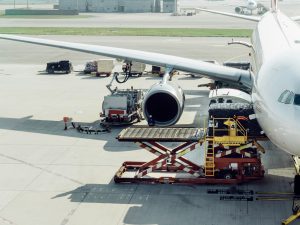Astral Aviation has added a Boeing 767-300 freighter as part of plans to renew its fleet, expand its capacity and fly longer distances, said official LinkedIn Post. The post added that the carrier had dry-leased the aircraft, which has extended range capabilities and a payload capacity of 52 tons. “We are thrilled to announce the arrival of our newly dry-leased Boeing 767-300F (MSN 24146 / Reg 5Y SVR), marking another milestone in Astral Aviation’s commitment to expanding our cargo capabilities and enhancing service reliability across our network,” said post. The airline added: “The 767-300F – a proven, efficient, and versatile freighter—will strengthen our ability to serve key markets with increased payload capacity, range, and operational flexibility.”
Read More »‘Global air cargo sector awaits impact of tariffs: Xeneta
According to industry analysts Xeneta, “Global air cargo volumes grew over 4 per cent year-on-year in April but with today’s removal of the de minimis threshold for shipments from China into the United States expected to dramatically disrupt e-commerce volumes in the coming weeks and massive uncertainty hanging over the macroeconomic outlook, the question for the air cargo market in 2025 has become ‘how bad will it be?’ Over the past 10 years, US consumers have paid no duty on shipments valued at $800 or less, causing the volume of cross-border packages into the US to soar to some 1.35bn annually. Similar (but lower) exemptions exist in other countries. From today (May 2), however, low-value products sourced from China and Hong Kong into the US will now be subject to 145% new tariffs, with products sourced from postal services paying a different 120% duty on the value of the goods or a $100 flat fee, rising to $200 on June 1.”
Read More »Challenge Group unveils B777-300 ERSF conversion programme
Challenge Group has launched its Boeing 777-300ERSF conversion programme, and stated there could be up to 10 of the conversion type in its fleet within the next five years. Challenge has already transferred the first aircraft in its conversion programme to IAI’s facilities for modification, said reports. The company anticipates converting three more aircraft and has options for an additional four. This follows the announcement by Challenge in January that it had signed a deal with lessor AerCap to add two Boeing 777-300ERSF freighters converted by Israel Aerospace Industries (IAI) to its fleet. In total, this means Challenge could eventually operate as many as 10 777-300ERSFs. Each 777-300ERSF has a payload capacity of nearly 100 tons.
Read More »‘FIATA is advancing emissions tracking & green corridor development’
Stéphane Graber, Director General, FIATA said, “FIATA promotes sustainability both through advocacy and practical tools. We are engaged in key multilateral discussions to ensure freight forwarders are recognised in climate dialogues, and we are advancing work on emissions tracking, green corridor development, the digitalisation of logistics processes, and the optimisation of multimodal transport. In parallel, we provide our members with training and guidance on implementing greener best practices, from carbon footprint measurement to modal shift strategies. Our goal is to empower Members to contribute meaningfully to global climate goals without compromising their operational viability.”
Read More »‘FIATA is all about innovation & collaboration’
CK Govil, President, ACAAI said, “One of the greatest strengths of the FIATA RAP Meeting is its power to connect minds from across the globe. I hope attendees leave with not just insights, but meaningful relationships—built on shared goals and a collective vision for the future of air cargo. This event provides a platform for open dialogue between industry leaders, regulators, technology providers, and freight forwarders. Whether it’s forming new business alliances, exploring joint ventures, or simply learning from each other’s experiences, the opportunities for collaboration are immense. More importantly, I hope attendees see India as a willing and capable partner in global logistics—a country that is open, innovative, and ready to co-create solutions that can drive the next wave of transformation in the air cargo industry. Networking at this event isn’t just about exchanging business cards—it’s about planting the seeds of future partnerships that can shape the direction of global trade.”
Read More »‘FTA opens market for MSMEs, enabling them to expand in UK’
Gautham R, Senior Manager, Global Air Freight and Head – Air Freight, India said, “India ranked as the UK’s 11th largest trading partner in the four quarters of 2024, contributing 2.4 per cent to the UK’s total trade. The top five traded products between the two nations included Oil, Clothing, Telecom & Sound Equipment, Pharmaceuticals and Iron & Steel (Ministry of Commerce). The recently introduced Free Trade Agreement (FTA) between India and the UK is poised to significantly benefit India’s MSME sector. With over 63 million enterprises employing well over 250 million people, Indian MSMEs contribute over 40% to the country’s total exports. The FTA opens up new market opportunities for these enterprises, enabling them to expand globally—particularly in the UK. To maximize this potential, MSME stakeholders must ensure that the pricing of Indian products—especially in competitive categories like Textiles—is sharp when compared to other exporting countries such as Bangladesh. Additionally, the FMCG sector in India stands to gain from reduced import tariffs on UK-origin products such as whiskey, gin, lamb, soft drinks, chocolates, and cookies, which will boost product diversity and market growth. It is important to support MSMEs by connecting them with the right buyers, enabling access to new markets, and driving business growth. This strategic collaboration is set to create long-term win-win outcomes for all stakeholders involved which what WIZ plans.”
Read More »‘FTA opens opportunities for joint ventures, tech collaboration, streamlined supply chains’
Vipin Vohra, Chairman, Continental Carriers said, “The India-UK FTA with lower tariffs is set to catalyse trade by enhancing market access, reducing costs and improving competitiveness for Indian exporters. Key sectors like textiles, gems and engineering goods will benefit from a level playing field in the UK market. For industry stakeholders, it opens up opportunities for joint ventures, technology collaboration, and streamlined supply chains. Lower input costs and increased investor confidence will further drive manufacturing and exports. Overall, the FTA lays the foundation for stronger economic cooperation, encouraging innovation, expansion, and long-term growth across both nations.”
Read More »‘Indian MSMEs, dairy sectors may face competition, must attain UK standards’
Kamal Jain, Director, Cargomen Logistics said, “The India-UK Free Trade Agreement, by lowering tariffs, aims to boost bilateral trade, reduce costs and enhance market access. Sectors like textiles, automotive and agri-products may gain competitiveness, while UK firms can tap into India’s large consumer base. It encourages MSMEs, startups and supply chain partnerships. However, challenges exist—Indian MSMEs and dairy sectors could face stiff competition and exporters may struggle with UK standards. Revenue loss from lower duties and uneven sectoral gains are concerns. Sensitive industries may be impacted by liberalized imports. A balanced implementation with safeguards is key to ensuring sustainable, inclusive growth for both economies.”
Read More »‘Logistics hubs like Ludhiana, already poised for growth, will see increased activity’
Arun Kumar, President, AMTOI stated, “The India–UK FTA is a major boost for Indian logistics, unlocking opportunities across sectors. With tariffs eliminated or reduced on 99 per cent of Indian exports, demand for efficient, scalable logistics services, especially in textiles, marine products, and gems, will surge. Logistics hubs like Ludhiana, already poised for growth, will see increased activity. The reduced tariffs on UK imports like automobiles and Scotch whisky will also drive inbound logistics. Moreover, streamlined customs and rules of origin enforcement will demand more sophisticated compliance and traceability solutions. Overall, the FTA is set to accelerate multimodal logistics, improve turnaround times, and promote greater investments in warehousing and last-mile connectivity.
Read More »‘Textiles, pharma, auto, perishables will benefit from FTA’
Xerrxes Master, Managing Director, Masters Group said, “The India-UK FTA, with its commitment to lower tariffs, is expected to significantly enhance bilateral trade and economic cooperation. By reducing import duties on a wide range of goods, the FTA will make Indian exports like textiles, pharmaceuticals, automotive parts and food products more competitive in the UK market. Conversely, Indian consumers and industries will benefit from access to high-quality British goods and services at lower costs. Industry stakeholders—including manufacturers, exporters, logistics providers, and investors—will benefit from increased trade volumes, reduced operational costs, and streamlined regulatory processes. The agreement is also likely to foster greater collaboration in sectors such as technology, clean energy, financial services, and education. Overall, the FTA marks a strategic shift toward deeper economic integration, supply chain resilience, and mutual growth, positioning both nations as key partners in a rapidly evolving global trade landscape.”
Read More » Cargo Breaking News
Cargo Breaking News









